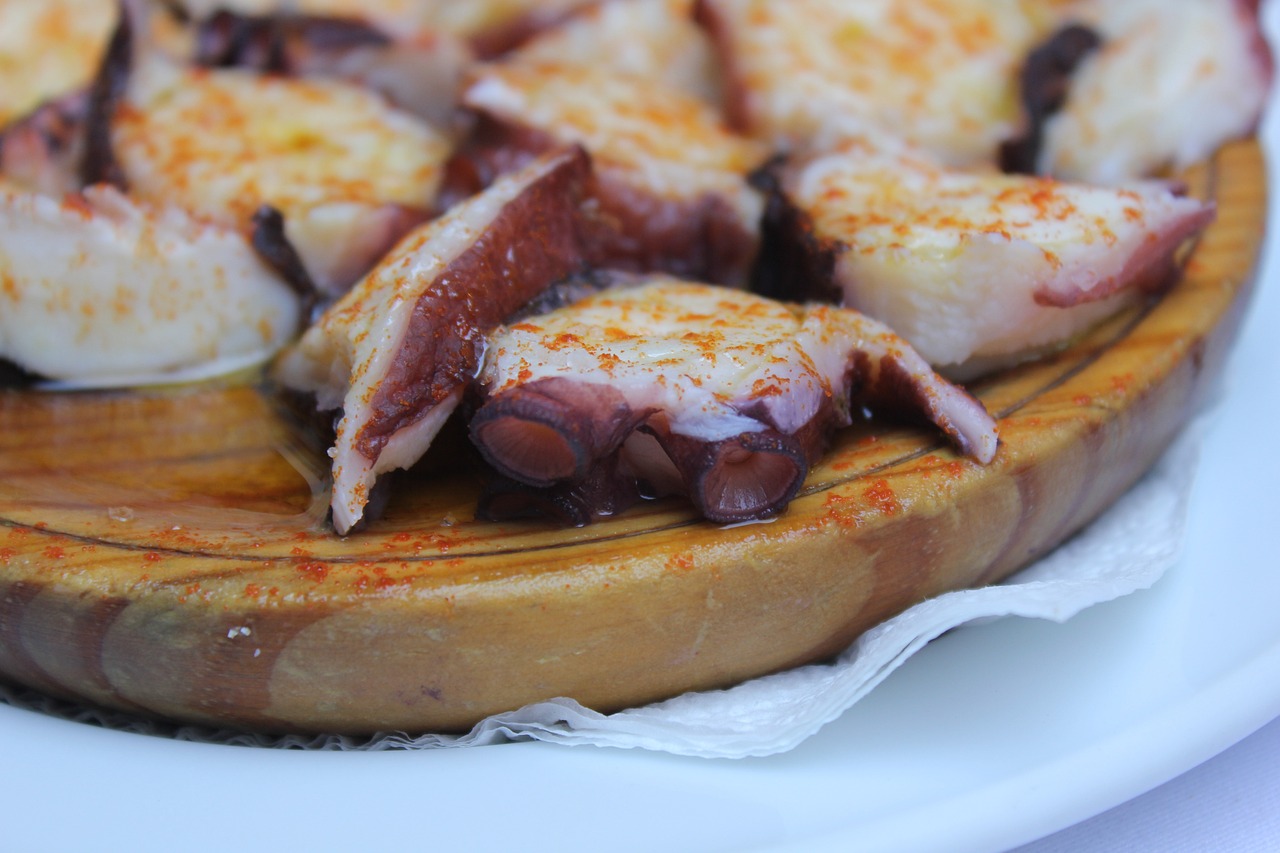Traveling often leads us to unexpected discoveries. If you walk the Camino de Santiago, discoveries are the order of the day. One of them is found in Melide’s kitchens. Melide is a relatively small town in the province of La Coruña, in Galicia. About 90 kilometers from Santiago de Compostela, Melide is known for having the best octopus in Spain –even though the town is pretty far away from the shore.
As you walk through it, you are likely to be enchanted by the unexpected smell of seafood, burning wood, and crisp air. This is the very heart of Galicia, and the place where an extraordinary recipe has been handed down for centuries.
It can be said that Melide’s history has been written by octopus’ tentacles in the scriptorium of the Oseira Monastery – a Cistercian abbey founded in the 12th century. Strict monastic rules forbade the monks from eating red meat. Octopus, being seafood, was surely allowed.
The monks developed ways to preserve and transport octopus from the Galician coast to the monastery, where they cooked it to perfection. It soon became part of their regular diet. Due to the monastery’s strategic location on the Camino de Santiago, Oseira became an important stop for pilgrims. Naturally, the monks were quick to share their octopus with visitors, who quickly recognized the exceptional taste of the dish. The fame of Melide’s octopus soon spread along the entire Jacobean route.
From the monastery to the tavern
As time went by, the recipe for pulpo a feira spread from the austere refectory of the Monasterio de Oseira to every home and taverns of Melide. The villagers adopted it as a symbol of their local cuisine, and it soon became an integral part of the local culture and tradition –a dish to be shared with family and friends at festivals and celebrations.
Even today, the preparation follows the very same ancient monastic ritual handed down from generation to generation for centuries. The cooks carefully choose the freshest, best octopus in the batch. It is then cleaned and cooked in large copper pots, using firewood as fuel. Cooking it slowly and carefully is important to make sure the texture is just right –not too hard, not too soft.
Tradition demands that pulpo a feira is cut into pieces and served on large wooden plates, with boiled potatoes and a touch of pimentón – paprika. It is also customary not to use any cutlery, dipping the pieces in coarse salt and pairing it with a good local wine. The taste is intense, with a characteristic aroma reminiscent of the sea. The soft texture of the octopus contrasts with the crispness of the potatoes, creating a truly unique combination of flavors.
Octopus Festival
Every year, in the second half of August, Melide hosts the Octopus Festival – a celebration dating back to the Middle Ages. The tradition of cooking grilled (not boiled) octopus during local festivals is said to have originated in this area of Galicia. Over the centuries, the festival has become increasingly popular, attracting visitors from all over the region and beyond.
Today, the Festival is an important cultural event that celebrates Galician gastronomy and traditions. It’s a great opportunity for people to get together, enjoy food, and have fun together.
The festival also offers a wide variety of other typical dishes, including empanadas (savory pies filled with meat, fish, or vegetables), calamares en su tinta (squid stewed in their own ink), tortilla (a thick omelet made of potatoes, onions, and eggs), cocido gallego (a rich stew of meat, vegetables, and chickpeas), queso tetilla (a cheese made from cow’s milk, with a distinctively strong yet delicate flavor), and tarta de Santiago (a typically Galician almond cake).
Most of these dishes can be paired with either Albariño or Godello wines (dry, white wines made from albariño and godello grapes respectively), a good Ribeiro (a red wine made from mencía grapes), or a short glass of orujo (a pomace-based liquor).
A food fit for pilgrims.
Located along the route of the French Way of the Way of St. James, Melide has been considered a mandatory stop on the route since, at least, the 15th century. Aymeric Picaud’s Liber de Perambulatione Jacobi (Book of Saint James’ Pilgrimage) already mentioned Melide as an important stop on the French Way in 1489, describing its market and its abundance of food – octopus in particular.
A few years later, in 1544, Sebastian Münster’s Universal Cosmography described Melide as being already famous, on the Way of Saint James, because of its pulpo á feira. Now it’s your turn to try this authentic Galician dish!





